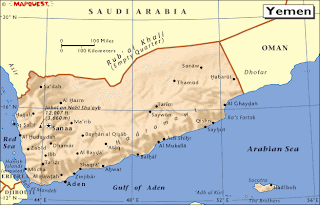
The following post was first published in this blog May 4, 2009. Given the fast-developing news about terrorism and Yemen, it seems to be even more appropriate for January of 2010, so I decided to give the piece an encore. Here it is, still fresh.
This is clear evidence that absolutely nobody connected with any decision-making in Washington, DC reads this blog. That comes as no surprise to me, of course, but I hate it when the evidence is so overwhelming. Damn.
It is also absolute evidence that none of the civilian authority back in D.C. pay much attention to General David Petraeus, who was among the first to see this coming. He rang the alarm bells first. Unfortunately for America, nobody back in D.C. chose to hear those bells ringing.
Anyway, here's the message from May that is finally getting through the noggins of those civilian decision-makers back in D.C.
- - - - -
U.S. officials are increasingly concerned that Yemen - the Arab world's poorest nation- is turning into the next Afghanistan by providing a sanctuary for al-Qaeda militants.
.
Yemen, which was the site of the pre-9/11 U.S.S. Cole attack that claimed the lives of 17 American sailors, has a 35 percent unemployment rate and a 50 percent literacy rate. Government authorities have warned the U.S. in recent months that many militants are returning from Iraq and Saudi Arabia to gather in three provinces bordering Saudi Arabia known as the "triangle of evil."
The following story was first published by the Washington Post on Sunday, May 3, 2009 and was written and filed by Donna Abu-Nasr of the Associated Press:
The cave tucked in the remote Saudi mountains near the Yemeni border was clearly a way station for Islamic militants, Saudi police say, pointing to the stock of guns and ammunition, nooks for holding hostages and cameras for filming them.
It even had buckets of sugar, rice and flour, as well as boxes of charcoal, candles, pasta and beans - supplies for a long stay by al-Qaida fighters moving across the border to prepare attacks in the kingdom.
The discovery in early April reinforced a growing fear in Saudi Arabia: that Yemen could become another Afghanistan right on its doorstep, an out-of-control state where al-Qaida runs free and exports violence into its neighbor.
The United States shares the Saudis' fear. Gen. David Petraeus, head of the U.S. Central Command, told Congress in April that the weakness of Yemen's government provides al-Qaida a safe haven and that terror groups could "threaten Yemen's neighbors, especially Saudi Arabia and other Gulf states."
Yemen is the Arab world's poorest nation - and one of its most unstable - making it fertile territory for al-Qaida to set up camp. The country is also in a strategic location, next door to some of the world's most important oil producing nations. It also lies just across the Gulf of Aden from Somalia, an even more tumultuous nation where the U.S. has said militants from the terror network have been increasing their activity.
Resources:
CIA FactBook: Yemen
.
0 comments:
Post a Comment